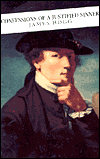 I have finished James Hogg’s The Private Memoirs and Confessions of a Justified Sinner: Written by Himself, with a detail of curious traditionary facts, and other evidence, by the editor. I love long titles! I couldn’t resist including the whole thing here. I won’t review the book tonight, but I did want to say a couple things. I loved it; it’s crazy and fascinating and weird. The long version of the title hints at its complexity: it’s got two narrators, and is a good example of the perspective-shifting technique Charlotte recently wrote about. It begins with an editor’s version of events, and then turns to the “confessions” of the justified sinner himself, and then closes with the editor again. They retell many of the same events, so part of the fun of the book is comparing their two versions.
I have finished James Hogg’s The Private Memoirs and Confessions of a Justified Sinner: Written by Himself, with a detail of curious traditionary facts, and other evidence, by the editor. I love long titles! I couldn’t resist including the whole thing here. I won’t review the book tonight, but I did want to say a couple things. I loved it; it’s crazy and fascinating and weird. The long version of the title hints at its complexity: it’s got two narrators, and is a good example of the perspective-shifting technique Charlotte recently wrote about. It begins with an editor’s version of events, and then turns to the “confessions” of the justified sinner himself, and then closes with the editor again. They retell many of the same events, so part of the fun of the book is comparing their two versions.
Yes, the book is strange and weird, but I’m not sure that justifies this sentence from David Groves, the guy who wrote the introduction to my edition:
No one will understand very much about Hogg’s Confessions on first reading.
Am I wrong, or is that not the best thing to say in an introduction? It seems to me an introduction should get the reader excited about reading the book, not turn the reader off. And it’s not true. I’m sure I’d understand much more on a re-reading, but, still, I got an awful lot on the first go-round.
Okay, more on the novel soon …

Yes, that’s curious, I did not find the novel so opaque myself, neither did the writer of my edition’s introduction. Huh. I wonder what he found so obscure about it?
Happy to read that you loved it though!
LikeLike
I loved this book, because it’s so weird. I found the nested narratives fascinating. I’m looking forward to what you have to say about it!
LikeLike
Yes, that does seem like quite the overcooked disclaimer there!
Introductions can be a trepidatious thing, sometimes. You don’t know if you should really read them, for fear of spoilers. I recently read an old novel by Frank Norris, [McTeague] and I worried over reading the Introduction…. but finally launched into it. It was a terrific intro., because it spoke mostly about the life of the author. But other times, Introductions are best left alone.
I think there should be introductions TO the Introductions, warning us of the perils of being introduced.
LikeLike
He probably thinks he’s being comforting, but I agree, a little explanation would probably be a better thing! I hadn’t even heard of this novel! So will be interested to hear all about it.
LikeLike
Yes, that’s a very odd way to begin an introduction, which might have immediately made me wary of the book (that’s why I don’t tend to read introductions to fiction till I’m done with a book). What a shame that would have been, because I LOVED it, too, when I read it. And come on, it’s not like reading The Book of Revelations or something. Perhaps he meant it can be read on a lot of different levels: horror story, philosophical text, psychological thriller, religious commentary?
LikeLike
Clearly David Groves has never met Dorothy. 🙂
LikeLike
What a weird thing to say in an introduction. I can’t wait to hear more about the book!
LikeLike
I’ve not heard of this one either. I think that intro would have scared me if I read it first. I try and leave them until after I’ve finished the book these days. I look forward to hearing about it, too!
LikeLike
Well, this one has certainly caught my interest; not only from your initial remarks which had me hooked, but also from the various comments!
LikeLike
Imani — oh, yes, and now that I’ve written more about it, I like it even better.
Sarah — yes, I love that sort of complicated narrative structure — it can be so fun to try to piece everything together.
Cipriano — I love the idea of an introduction to the introduction! The introducer should describe his/her theory of introductions first, so we can know whether to trust him/her or not.
Litlove — I don’t think this is a well-known novel, which is really too bad because it’s fascinating — lots of good psychological stuff going on.
Emily — yeah, it’s that kind of complexity he was referring to, I think, as well as the complexity of the two narratives and how they fit together. But still, definitely overdone.
Bikkuri — ha! Yeah, I’ll show him a thing or two 🙂
Stefanie — I did my best in my latest post! I think it’s a fascinating book and that more people should read it 🙂
Danielle — I try to leave intros until later too, although sometimes I’ll skim them for interesting information as I read along. If it seems like there are plot spoilers, I’ll stay far away.
Jenclair — oh, I think you’d like it, if you are interested!
LikeLike